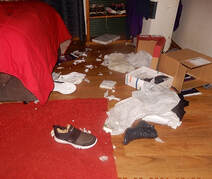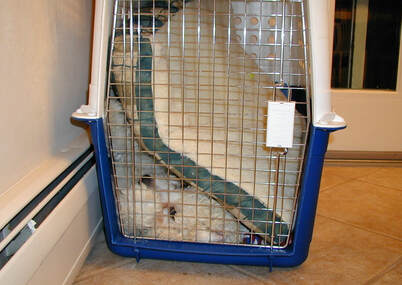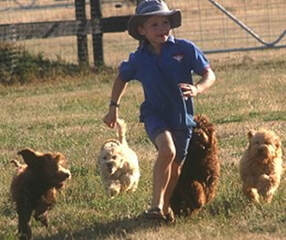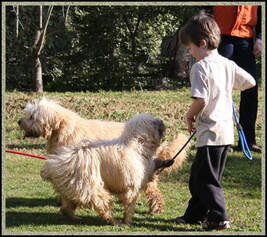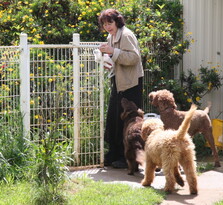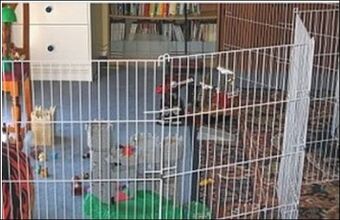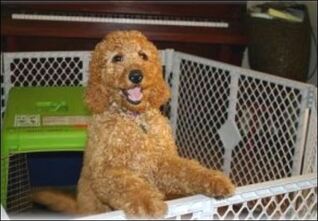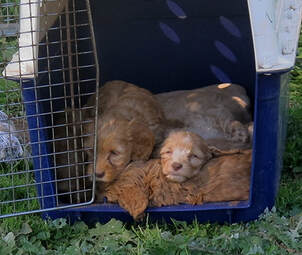RAISING YOUR COBBERDOG PUPPY
A Simple guide to RAISING a dog who's a pleasure to live with.
|
One of the reasons Australian Cobberdogs appeal to us is because they are so intuitive and reactive to human emotion. But this can have its downside too.
From the first moments of arrival your puppy is studying you and assessing whether you can be trusted to be pack leader. If the answer is 'no' then pack leader position defaults to the puppy. |
Puppy is cute, and understandably the new focus of everyone in the family. Adored and fussed over, it doesn't take long before as far as your puppy is concerned, its behavior is open slather because you are the puppies' willing slaves. So I recommend that BEFORE your cute bundle arrives, you sit down as a family an discuss your way forward.
FIRST.
Read these Puppy Raising Notes.
Read these Puppy Raising Notes.
Your browser does not support viewing this document. Click here to download the document.
- Before your puppy arrives, sit down with pen and paper and discuss with your family how you will want your dog to behave indoors when he/she is a grown up adult dog. Some rules could be (and recommended) NO running and playing indoors, NO jumping up onto furniture unless invited, when you call your puppy to you, have him/her SIT before petting. for instance one of my own Rules is All 4 feet on the ground BEFORE PETTING OR TREATS.
- Write down your RULES so that everyone understands them.
- STICK to your rules from Day One.
It can be difficult to set house rules when you're faced with a comical clown of a dog who makes you laugh whenever it is in trouble! But consistent you need to be for best results. This will will repay you a thousand fold after those first few months of giggling challenges. Although you need to be firm, remember that training should be FUN! Both for you and your dog. And these dogs are experts at making you laugh to get themselves out of trouble!
|
Their saving grace is that they long to please you and are intuitively tuned in to your emotions. So make the most of this and make sure you have eye contact before you instruct them to do something.
Long ago I was taught to avoid direct eye contact with a dog but these dogs seek it and yearn for it. |
First Night Home With Your Australian Cobberdog Puppy....
and everyone getting a good night's sleep!
THAT FIRST NIGHT! Puppy has had its whole world turned upside down New people, new home, different sounds sights and smells. When you put him to bed in his crate - how is he to know you are EVER coming back again?
If he/she can't settle, put the crate beside your bed. If he cries, you can dangle your fingers against his door and reassure him with your voice. If this doesn't work, completely cover the crate with a blanket. This helps him to feel safe. Remember it was this "thing" that carted him off and away from everything familiar in his young life.
If he/she can't settle, put the crate beside your bed. If he cries, you can dangle your fingers against his door and reassure him with your voice. If this doesn't work, completely cover the crate with a blanket. This helps him to feel safe. Remember it was this "thing" that carted him off and away from everything familiar in his young life.
Rutlands Puppies are crate trained and look on their crate as a pleasant place. The crate should not be used as 'time out' or for punishment. If your dog needs to be transported by crate in the future such as by 'plane or public transport, this would cause stress during the journey.
Remember that your new puppy will be missing its siblings and the reassurance of cuddling up with its litter mates to sleep. Rumple up the bedding, and add something like some rolled up blankets or similar, to simulate the way puppies sprawl all over each other to sleep.
Rutlands puppies are raised with music or radio playing, so these sounds may help your new puppy to relate to something familiar when left alone for the first time at night. ... those long lonely hours when puppy must be wondering if you are ever coming back again!
Remember that your new puppy will be missing its siblings and the reassurance of cuddling up with its litter mates to sleep. Rumple up the bedding, and add something like some rolled up blankets or similar, to simulate the way puppies sprawl all over each other to sleep.
Rutlands puppies are raised with music or radio playing, so these sounds may help your new puppy to relate to something familiar when left alone for the first time at night. ... those long lonely hours when puppy must be wondering if you are ever coming back again!
Nipping And Biting
Young children should be taught not to squeal and run with a new puppy until it has had time to learn the rules. Puppies instinctively follow movement, and running screaming with flapping arms, is an invitation to the pup to jump up and latch onto clothing....or anything else it can reach! When the puppy has understood and learned the rules, fun games can begin. Until then parental supervision is a must.
Puppies learn quickly to respect little children when their parents take the time to teach their kids how to interact with the puppy.
Puppies nip because this is the way they played with their siblings to find out who was puppy pack leader. This is a primitive instinct, because in the wild, the very survival of your puppy's ancient forebears depended on them knowing their place in the hierarchy of the pack. If you don't establish this confidence in your new puppy, it will take on the role by default and will soon be out of control.
YOU and your family are your puppy's new pack you need to get the message through very quickly who is the leader...and it should not be the puppy! NIPPING MUST BE CORRECTED QUICKLY or as with all dogs, it may turn into biting later on. And if this happens it will be YOUR fault....not the puppy's!
YOU and your family are your puppy's new pack you need to get the message through very quickly who is the leader...and it should not be the puppy! NIPPING MUST BE CORRECTED QUICKLY or as with all dogs, it may turn into biting later on. And if this happens it will be YOUR fault....not the puppy's!
Puppies follow movement and grab anything that moves. I recommend that you watch this little video I made of some 8 week old puppies at Rutlands. (narrated)
Ways for you to establish leadership:
|
1. Always walk through a doorway or gateway first. Guide your puppy by using the leash at first, with the instruction - name first then "WAIT". Walk through the door or gate then 'invite' the puppy to come through. Follow up with praise but not too effusive! Remember that praise is for encouragement or appreciation, After all, you EXPECT your position of pack leader to be respected.
|
2. You and your family eat FIRST. Puppy must wait patiently, without begging, until you have finished eating and are ready to feed him. If necessary, tether him with a blanket and toy until you are done eating.
3. TEACH your puppy to stay alone without complaint. Most cases of separation anxiety are caused through owners who fail to allow their puppy to build self confidence and trust that they will return. Start with short periods and never return while puppy is protesting. When you leave say "I'll be back" When you return, say 'I'm back".
4. When you do return, hold back on enthusiastic greetings until the puppy's excitement level has dropped even if this means totally ignoring him for ten to fifteen minutes.
3. TEACH your puppy to stay alone without complaint. Most cases of separation anxiety are caused through owners who fail to allow their puppy to build self confidence and trust that they will return. Start with short periods and never return while puppy is protesting. When you leave say "I'll be back" When you return, say 'I'm back".
4. When you do return, hold back on enthusiastic greetings until the puppy's excitement level has dropped even if this means totally ignoring him for ten to fifteen minutes.
Potty Training
Going Potty on a Leash
It is completely unnatural for a dog or puppy to go to the toilet on a leash! A lot of dogs can be trained to do this, but they don't like it. Dogs and puppies have by instinct, a ritualistic behavior during which they select what to them is the 'right' place to go to the toilet. This behavior involves a lot of trotting to and fro, back and forth, nose to the ground, circling, sniffing, until eventually they find exactly the 'right spot'. By insisting that your puppy go to the toilet on a leash, you may possibly slow down the house training process and this can also be the reason some families have a hard time with their puppy's potty training, because the puppy refuses to go potty on the leash, but the minute he is let loose inside the house he immediately goes potty inside.
HELP YOUR PUPPY LEARN TO STRENGTHEN ITS BOWELS AND BLADDER
Too much freedom too soon is the major reason that puppies get into trouble. A puppy left unsupervised to wander about, investigate and potty at will when no one is watching, will have a difficult time learning how to behave properly in your home and also be more difficult to potty train.
TIP: DO NOT LET A NEW PUPPY HAVE THE RUN OF THE WHOLE HOUSE!
Restrict the area your puppy has to run around indoors. When you are too busy to supervise, pop the puppy into a portable play run until you are ready to watch over him again. Some newspaper in one corner will help out if the puppy gets 'caught short'. Rutlands puppies are paper trained for you.
Restrict the area your puppy has to run around indoors. When you are too busy to supervise, pop the puppy into a portable play run until you are ready to watch over him again. Some newspaper in one corner will help out if the puppy gets 'caught short'. Rutlands puppies are paper trained for you.
CRATE TRAINING. CRUEL OR KIND?
|
It's a personal choice whether to crate or not. Consider this. If your dog ever has to be hospitalized for any reason, he/she will be MUCH less stressed if already content to be in a crate. But If you crate your puppy overnight, or when you are not able to supervise it inside your home, you will minimize toilet 'accidents' and so will speed up the house-training process.
|
I do recommend crating to help with potty training but it's not acceptable to confine a puppy (or a grown dog) to a crate all day whilst a family is away. It is also bound to make your puppy or dog hyperactive and full of nervous energy when finally let out. Training will be difficult and unwanted behaviors will result.
If you choose not to crate, then it is a good idea to restrict the puppy's access to any but one room at a time - the room you are in, so that you can pick up on puppy's tell tale sniffing at the floor or circling when it wants to go outside. Quickly scoop up the puppy, and CARRY it to your chosen spot in the yard, where it will soon become a habit for puppy to consider its toilet place. One room is all you can properly supervise.
The crate should never be used as a place of 'punishment'. It should be a place where puppy can have peace and quiet from the boisterous attention of the children, and where he feels safe and not likely to be disturbed.
Your Rutlands puppy will have already been crate trained, but could try you out to see if you are really serious! If he complains, yelps or barks and refuses to stop when asked to 'be QUIET' put a blanket over the entire crate so the puppy can not see out. Only lift it up when your puppy has been quiet for at least five minutes. Lift the blanket, praise the puppy with his name and say 'GOOD QUIET' in a pleased tone, and then if he acts up again right away as he probably will, say 'QUIET' again and cover the crate over. Repeat until the lesson is learned. You'll be surprised how quickly this works!
The crate should never be used as a place of 'punishment'. It should be a place where puppy can have peace and quiet from the boisterous attention of the children, and where he feels safe and not likely to be disturbed.
Your Rutlands puppy will have already been crate trained, but could try you out to see if you are really serious! If he complains, yelps or barks and refuses to stop when asked to 'be QUIET' put a blanket over the entire crate so the puppy can not see out. Only lift it up when your puppy has been quiet for at least five minutes. Lift the blanket, praise the puppy with his name and say 'GOOD QUIET' in a pleased tone, and then if he acts up again right away as he probably will, say 'QUIET' again and cover the crate over. Repeat until the lesson is learned. You'll be surprised how quickly this works!
Teach your puppy to use a specific place in your yard to go potty
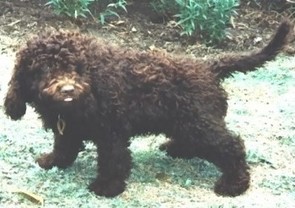
Put some of puppy's droppings in a particular part of your yard, and you can train your puppy to use the same place every time for doing its toilet. CARRY your puppy straight outside to this spot every time and it will soon become habit.
If puppy is peeing inside, after being left outside for awhile, then it hasn't been out long enough. Just increase the time. DON'T PLAY WITH PUPPY during toilet trips. Praise and treat when puppy relieves itself outside, and then bring it back in again. Do NOT rub its nose in it's mistake.
Very young puppies need to go potty about every hour, and at some other predictable times such as after waking up from a sleep, after eating or drinking, after anything exciting....and then some!
If your puppy is sniffing the ground, walking in circles, seems a little unsettled, and you are not sure if it wants to go potty or not, my advice to you is IF IN DOUBT-OUT !
If puppy is peeing inside, after being left outside for awhile, then it hasn't been out long enough. Just increase the time. DON'T PLAY WITH PUPPY during toilet trips. Praise and treat when puppy relieves itself outside, and then bring it back in again. Do NOT rub its nose in it's mistake.
Very young puppies need to go potty about every hour, and at some other predictable times such as after waking up from a sleep, after eating or drinking, after anything exciting....and then some!
If your puppy is sniffing the ground, walking in circles, seems a little unsettled, and you are not sure if it wants to go potty or not, my advice to you is IF IN DOUBT-OUT !
|
Raising dogs is like beginning a marriage....Start out the way you'd like to finish!
If you let your puppy stand on his hind legs for cuddles now while he is so small and cute, he will stand on his back legs, or jump up at you when he's big and cute too - but in a totally different way! Start on DAY ONE with guiding your new puppy so that he/she understands what is appropriate behavior in your home right from the start. When he jumps up on you for a cuddle, gently but firmly plant him down onto his little bottom, saying 'OFF' and then fondle and cuddle him when he has all four paws on the floor with "Good Off" in a pleased tone..... not too excitable or he'll jump right up and you'll have to start all over again. |
There is no such thing as a 'bad' puppy

THERE IS NO SUCH THING AS A 'BAD' PUPPY, ONLY A CONFUSED OR OUT OF CONTROL ONE. WHAT IS NOT ACCEPTABLE BEHAVIOUR IN YOUR HOME MAY BE PERFECTLY OK IN SOMEONE ELSE'S.
THE ONLY WAY YOUR PUPPY WILL LEARN WHAT BEHAVIOUR PLEASES YOU IS FOR YOU TO SHOW HIM OR HER. IT ISN'T FAIR TO LET THEM DO SOMETHING ONE DAY BUT NOT THE NEXT. SO DON'T KEEP SHIFTING THE GOAL POSTS.
Tips to get you started -
THE ONLY WAY YOUR PUPPY WILL LEARN WHAT BEHAVIOUR PLEASES YOU IS FOR YOU TO SHOW HIM OR HER. IT ISN'T FAIR TO LET THEM DO SOMETHING ONE DAY BUT NOT THE NEXT. SO DON'T KEEP SHIFTING THE GOAL POSTS.
Tips to get you started -
DON'T want a dog who will jump on people or furniture unless invited?
Then NEVER treat or pat your puppy unless all four paws are on the ground. When you cuddle your sweet new puppy up in your arms or on your lap, FIRST use a word which will always be your 'invitation' later on. If no invitation, no coming up! When baby puppy runs to you, plonk its little bottom on the floor with both hands on front of its shoulders before petting until it becomes a habit. Do not push down on its back to make it sit.
DO want your dog to be quietly behaved indoors?
Then leave boisterous exciting games for outside. For the first few weeks, put the lead on your puppy for the first ten to fifteen minutes inside. Clip the lead to your belt, or tether puppy close by to a solid piece of furniture, with a bed and toys. Ignore protests and reward sitting or lying down quietly until YOU are ready to release him. NEVER leave a puppy not supervised when tethered. Check your city's by laws for the age a dog is permitted to lawfully be tethered to anything other than yourself.
DO want your dog to be gentle and sensible around the youngest children?
Then DO be aware that your tone of voice and behaviour sets the scene for your dog! Especially for puppies who are still learning your ways. Quick patting and high voice are exciting and stimulating to your dog. A calm lower voice is soothing and not exciting to your dog. TEACH the children not to squeal and shout when playing with your puppy. And NEVER correct your dog in anger. Go away and kick a rock and return to your dog when you've cooled off.
DO want your dog to be a good eater?
Then DON'T leave food lying around all day. Give your dog twenty minutes to finish a meal and whisk away anything not eaten in that time until the following feeding time.
DO want to have a mellow dog?
Then BE mellow around your dog. High pitched excited voice equals an excitable dog, often mistaken for the dog being 'high energy'.
Low pitched voice is both soothing and authoritative and equals a calm mellow dog.
Dogs recognize yelling and screaming as lack of control.
Low pitched voice is both soothing and authoritative and equals a calm mellow dog.
Dogs recognize yelling and screaming as lack of control.
